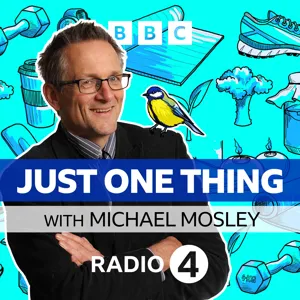Podcast Summary
Activate your relaxation response through progressive muscle relaxation: Focusing on individual muscle groups and tensing then relaxing them triggers a cascade of responses to help change the way you think and feel, promoting relaxation and reducing stress
Activating your relaxation response, which is essential for achieving inner peace and reducing stress, can be done through progressive muscle relaxation. This technique involves focusing on individual muscle groups, tensing them, and then relaxing them, sending signals to the brain that trigger a cascade of responses to help change the way you think and feel. It's a simple yet effective way to activate your relaxation response and find calm in a fast-paced world. Remember, relaxation isn't just a state of mind, it's a whole body thing, and focusing on your muscles is a proven way to help achieve it. So take some time to unwind, get comfortable, and give it a try. And if you're looking to start your weight loss journey, consider PlushCare, where you can speak with a board certified physician about a personalized weight loss plan and potentially receive FDA approved medications.
Reduce stress through progressive muscle relaxation: Intentional relaxation techniques, like progressive muscle relaxation, can lower cortisol levels, boost mood, alleviate pain, and trick the brain into feeling less tense and anxious by activating the mind-body connection
Our mind and body are deeply connected, and intentional relaxation techniques, such as tensing and then releasing muscles while breathing, can significantly reduce stress, lower cortisol levels, boost mood, and even alleviate pain. This technique, known as progressive muscle relaxation, works by activating the mind-body connection and influencing the interconnected brain cells responsible for tension, breathing, thoughts, and emotions. By targeting these external bodily responses to stress, we can effectively trick our brain into feeling less tense and anxious. This holistic approach to managing stress highlights the profound interconnectedness between our emotional experiences and physical sensations.
Relaxation Techniques: Breathing and Progressive Muscle Relaxation: Breathing techniques and progressive muscle relaxation are effective methods to activate the relaxation response, reducing stress and improving well-being. Daily practice of progressive muscle relaxation, developed by doctor Edmund Jacobson, involves focusing on the feeling of softness as tension dissipates.
There are various methods to activate the relaxation response in your body and brain, leading to reduced stress and improved well-being. Two effective techniques are changing your breath and practicing progressive muscle relaxation. Changing your breath can alter your brain chemistry, impacting various nodes in the network. Progressive muscle relaxation, on the other hand, influences the parasympathetic nervous system, which calms, restores, and reinvigorates your body and brain. This results in decreased cortisol and noradrenaline levels. Progressive muscle relaxation, developed by doctor Edmund Jacobson, involves daily practice, starting with your feet and working your way up, using your breath as a guide. Even as little as 15 minutes a day can be beneficial. The key is to focus on the feeling of softness as tension dissipates, and repeat the exercise with less tension each time. This practice can help clear your mind and promote relaxation.
Practicing muscle relaxation techniques: Focusing on tension and releasing it in muscles promotes relaxation and signals the brain to reduce stress.
Practicing relaxation techniques, such as contracting and releasing various muscle groups, can help strengthen the relaxation response in your body. This response, triggered by your parasympathetic nervous system, leads to a decrease in stress chemicals and an increase in calming neurotransmitters. By focusing on tension and then releasing it, you can send signals from your muscles to your brain, promoting relaxation throughout your body and mind. This can be done by contracting and releasing muscles in your stomach, shoulders, and face. The tension and subsequent release create a contrast that highlights the importance of relaxation and can lead to a more calm and tranquil state.
Practice Progressive Muscle Relaxation for Stress Relief: Practicing progressive muscle relaxation involves tensing and releasing each muscle group, reducing tension and activating relaxation response, leading to feelings of calm and relaxation.
Practicing progressive muscle relaxation can help reduce tension in your body and clear your mind. This simple yet effective technique involves tensing and then releasing each muscle group in your body, allowing you to release stress and tension. The result is a feeling of calm and relaxation. It's important to remember that there are other ways to activate your relaxation response as well, and in future episodes, we'll explore more techniques such as visualization. So, if you're feeling stressed or anxious, give progressive muscle relaxation a try. It could make a big difference in how you feel. And if you want to continue learning more about relaxation techniques and other mindfulness practices, be sure to subscribe to this podcast on BBC Sounds.

